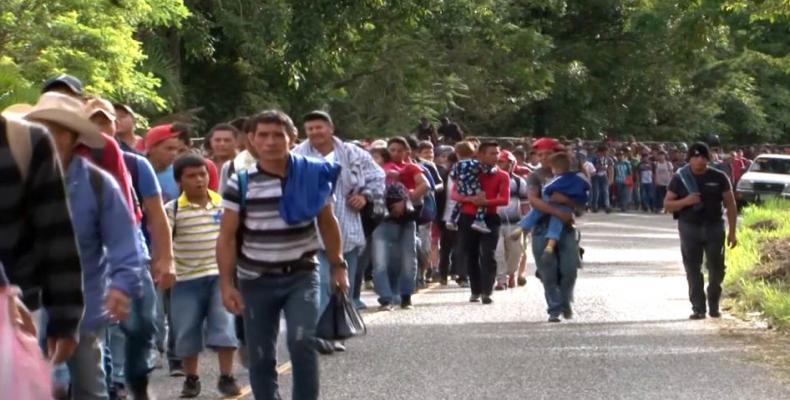
Guatemala City, October 4 (RHC)-- The Guatemalan government is ramping up efforts to halt the exodus of thousands of Honduran migrants attempting to reach the United States.
More than 3,000 Honduran migrants and asylum seekers entered Guatemala on Thursday without undergoing the required immigration and health checks the government has implemented to prevent the spread of COVID-19.
The “migrant caravan” then splintered into smaller groups, some of which continue to advance while others were blocked by police and military forces. To date, slightly more than 2,000 Hondurans have been sent back.
Honduras is one of the top countries of origin of migrants to the US, which deported more than 100,000 Hondurans in 2019. Several such migrant caravans have formed in the past two years amid political turmoil, violence, and rampant corruption in Honduras and as the COVID-19 pandemic aggravated already high levels of unemployment and poverty.
“There is no work in our country,” Jose Luis Avila Castillo, a 20-year-old Honduran migrant, told Al Jazeera outside a migrant shelter in Guatemala City.
Avila Castillo and a friend left the Honduran capital, Tegucigalpa, to join the caravan hoping to make it to the United States and find jobs to support themselves and their relatives. Avila Castillo said he and his mother left his violent father last year but have been unable to make ends meet. "I leave because I want to support her,” said Avila Castillo. “We want to provide for our families.”
A steady trickle of Hondurans arrived in Guatemala City on Friday afternoon, stopping to pick up food and hygiene supplies at the Casa del Migrante migrant shelter, which is not providing lodging due to the COVID-19 pandemic. They managed to get rides to the capital from eastern Guatemala, where authorities are cracking down on migrants.
Guatemalan President Alejandro Giammattei declared a “state of prevention” on Thursday in six of the country’s 22 departments, or administrative regions, including all four bordering Honduras. The measure restricts freedom of movement and facilitates military deployment.
Guatemala opened its borders two weeks ago after six months of closure due to the pandemic, but non-residents must present a negative COVID-19 test result upon entry. Only 70 Hondurans arriving with the caravan did so, according to Guatemalan immigration officials.
Regional representatives from the Office of the United Nations High Commissioner for Human Rights estimated between 3,500 and 4,000 Honduran migrants and asylum seekers entered Guatemala on Thursday. Soldiers and police were deployed to checkpoints and operations in the departments affected by the state of prevention.
As of Saturday morning, Guatemalan authorities had deported 2,065 Hondurans, according to police. The government maintains these are “voluntary returns” but most were blocked by military and police forces before accepting transport back to the border in army trucks and other vehicles.
The remaining caravan participants are spread out in small groups along routes to both the El Ceibo border crossing into the Mexican state of Tabasco and the Tecun Uman crossing into Chiapas.
Dozens of local Red Cross volunteers have provided water, medical assistance and information about COVID-19 to more than 2,300 migrants along the way, said Maria Rossell, a spokeswoman for the Guatemalan Red Cross.
“We are mainly seeing dehydration, respiratory infections, foot wounds, and muscle pain,” she told reporters.
The COVID-19 pandemic and lockdown measures have plunged countless Hondurans further into poverty. More than $200 million in multilateral bank loans were destined to address the emergency, support the health sector and food supply chain, and reactivate the economy.
“That money never reached the population. People stayed in their homes practically dying of hunger,” said Alvarado.
The Honduran caravan will not be allowed to enter Mexico, where officials said foreigners endangering public health may face years in jail. Hundreds of immigration agents, as well as National Guard and military, have been deployed to Mexico’s southern border.

